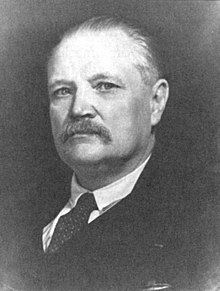Michael Rostovtzeff
| Michael Rostovtzeff | |
|---|---|

Michael Rostovtzeff
|
|
| Born | Mikhail Ivanovich Rostovtzeff November 10 [O.S. October 29] 1870 Zhitomir, Russian Empire (now Ukraine) |
| Died | October 20, 1952 (aged 81) New Haven, Connecticut, U.S. |
| Citizenship | USA |
| Nationality | Russia |
| Fields | Archaeology, History, Ancient History |
| Institutions | University of St. Petersburg University of Wisconsin—Madison Yale University |
Mikhail Ivanovich Rostovtzeff, or Rostovtsev (Russian: Михаи́л Ива́нович Росто́вцев) (November 10 [O.S. October 29] 1870, Zhitomir, Russian Empire – October 20, 1952, New Haven, USA) was an ancient historian whose career straddled the 19th and 20th centuries and who produced important works on ancient Roman and Greek history. He was a member of the Russian Academy of Science.
Rostovtzeff was the son of a Latin teacher. Upon completing his studies at the universities of Kiev and St. Petersburg, Rostovtsev served as an assistant and then as a full Professor of Latin at the University of St. Petersburg 1898–1918. In 1918, following the Russian Revolution, he emigrated first to Sweden, then to England, and finally in 1920 to the United States. There he accepted a chair at the University of Wisconsin–Madison before moving to Yale University in 1925 where he taught until his retirement in 1944. He oversaw all archaeological activities of the latter institution in general and the excavations of Dura-Europos in particular. He is believed to have coined the term "caravan city".
While working in Russia, Rostovtzeff became an authority on the ancient history of South Russia and Ukraine. He summed up his knowledge on the subject in Iranians and Greeks in South Russia (1922) and Skythien und der Bosporus (1925). His most important archaeological findings at Yale were described in Dura-Europos and Its Art (1938).
Glen Bowersock described Rostovtzeff's views as having been largely formed by the age of thirty, developing mainly only in the quality of execution in later life, and making him "the last of the nineteenth-century ancient historians". Rostovtzeff was known as a proud and slightly overpowering man who did not fit in easily. In later life, he suffered from depression.
...
Wikipedia
